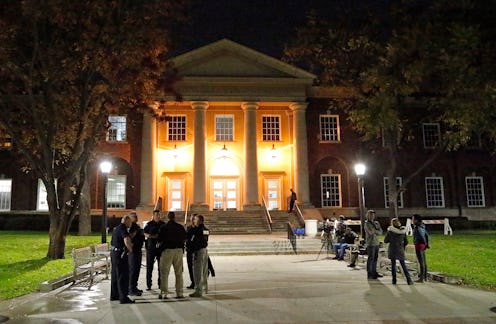Life
This School Had Segregated Sororities Until Now

Now that August is here, students everywhere have to think about the first day of school looming on the horizon. And in some places, that first day of school can look very different from years past, like at the University of Alabama where students will, for the first time, be returning to a campus with an integrated Greek system. And no, this article is not a reprint from 1969.
Last year, students at University of Alabama fought for integration of the campus sororities, which at the time had only ever knowingly admitted one black student since their founding. Though separate black sororities, which do not fall under the Panhellenic Council, exist on campus, the main Greek system on campus was known for being hostile to black pledges, with black girls being rejected on the flimsiest of pretenses, as Marie Claire reported at the time. Because in the twenty-first century, making up an excuse about someone wearing an ugly dress makes it not racist, right?
While sororities themselves were reluctant to change, after several whistle-blowers drew attention to the problem the administration eventually forced the sororities' hand by requiring them to reopen their bidding process and leave it open for the remainder of the year. By the end of the year, the houses had bowed to pressure and 21 black women were admitted to traditionally white sororities.
The question, of course, is what might happen in the new school year. Now that University of Alabama students are, for the first time, returning to a campus with an integrated Greek system, it's unclear how will things play out this year. This is especially true given that it's unclear how helpful administrators might prove going forward, given that the school is no longer under the national scrutiny they experienced last year. And then there's the fact that the university's spokeswoman has stated that, "The University of Alabama now has one of the most diverse Greek systems in the nation," when in reality only 0.4 percent of the sorority members are black, as opposed to 12 percent of the student body. All in all, it doesn't bode well for continuing diversity, if that's the level of understanding the administration demonstrates.
When people think of integration, it usually calls to mind the 1960s, not the 21st century. Segregation, in the popular imagination, is a problem from another era. But the truth is that integration, if it is to be meaningful and lasting, takes time to achieve, and clearly there are places where work still has to be done. Ultimately, this challenge is something the students and administrators at the University of Alabama will need to work through themselves, not something the outside world can figure out for them. But that doesn't mean we have completely stopped paying attention, either. So what will the new school year bring? Only time will tell.